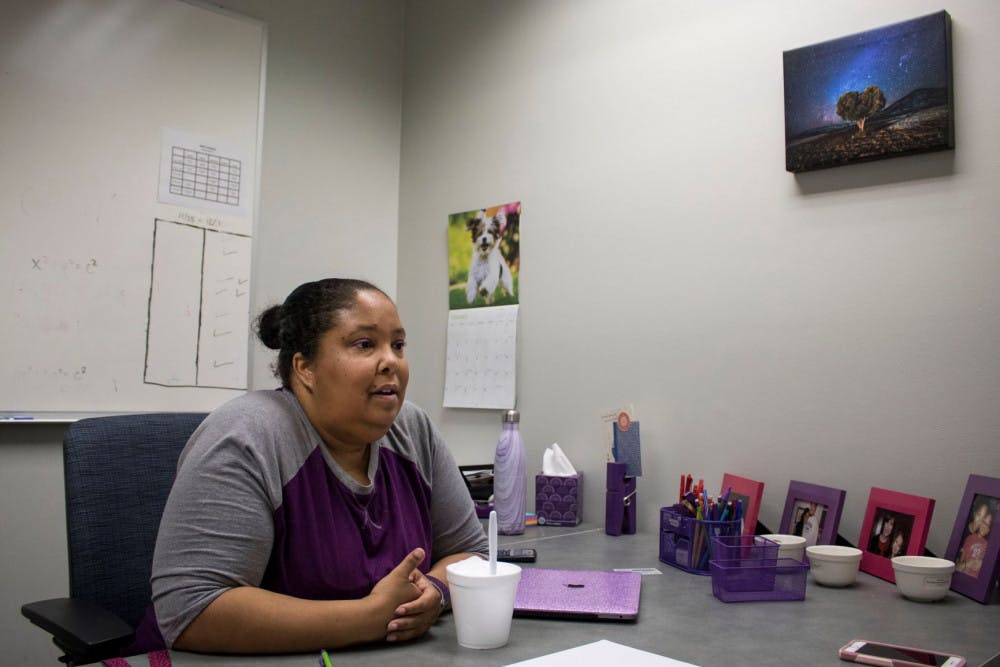Math always came easily to Melissa Shabazz.
She remembers learning how to toy with numbers growing up thanks to her grandfather, who encouraged her to pursue a career in mathematics, she said.
Growing up in Missouri and going to majority white schools, she often didn’t see herself represented as an African American woman.
This didn’t deter her. Instead, she used it as an opportunity to pave her own path, forging a career in mathematics.
Now, as a lecturer at UF with a doctoral degree in math, she is the only African American in the UF Mathematics Department.
“I had the advantage. I just didn’t see people that look like me, period,” she said. “I felt like I could carve my own path because there wasn’t really anyone to look to.”
The department has 58 faculty members, according to the UF Institutional Planning and Research. The only other black faculty member in the UF mathematics department is Calistus Ngonghala, a professor from Cameroon. African Americans received just 1 percent of mathematics doctoral degrees granted in the last decade, according to The New York Times.
Out of 5,506 UF faculty members, 239 are black or African American, or 4.34 percent, according to the UF Institutional Planning and Research.
When thinking about the factors that may lead to this disparity, Shabazz believes Americans, in general, prefer to go into economics and statistics fields where pay is higher.
However, representation is also important to get people involved, she said.
“A lot of people, they don’t see people that look like them doing anything like that,” she said. “So they don’t see that’s an option.”
It’s crucial for a broad array of ideas to circulate, even in a field as calculated as math, said Kevin Knudson, UF Mathematics department chair.
“People think mathematics is very rigid, and it is,” he said. “But different points of view will certainly lead to solutions that you might not have been able to find before.”
Knudson, who is white, recalled being an undergraduate at Virginia Polytechnic Institute and State University in the late 1980s where there was one African American faculty member, he said. When he was at Duke University for his master’s, there were none.
“The numbers play out in my personal experience,” he said. “Even when you go to mathematics conferences, it’s rare to see people of color.”
The lack of African Americans in mathematics has been a problem that the American Mathematical Society still addresses, Knudson said. However, he said he hasn’t noticed much change.
“This is a long-standing problem in the sciences,” he said. “Talent is evenly distributed. There are other sort of structural or social factors that I think are playing a role.”
This disparity reflects a larger structural issue that begins in grade school called the “leaky pipeline,” he said. The “leaky pipeline” refers to students exiting certain fields at critical points along the path for various reasons and often applies to people of color and women.
“It’s a challenge,” he said. “It’s not that departments don’t want to hire good mathematicians of color, it’s that there is a real supply problem.”
However, the problem is far more complicated, and the reasons for the disparity are still being researched, Knudson said.
To combat the lack of African American mathematicians at the university level, Knudson said the graduate recruiting chair attends annual meetings on this issue and reaches out to students at Historically Black Colleges and Universities.
Even with these implementations, Knudson said there hasn’t been much change in the enrollment of black students pursuing math. In 2017, out of 64 math doctoral students, there were only two, or about 3 percent, black or African Americans, according to UF Institutional Planning and Research.
While the university is still trying to attract more graduate students of color into the Ph.D. program, the issue is rooted deeper than what’s happening at the university level, Knudson said.
Melissa Shabazz, a UF math lecturer, works in her office Saturday in Little Hall. Shabazz is the only African American professor in her department. She started working at UF during Fall 2018.






